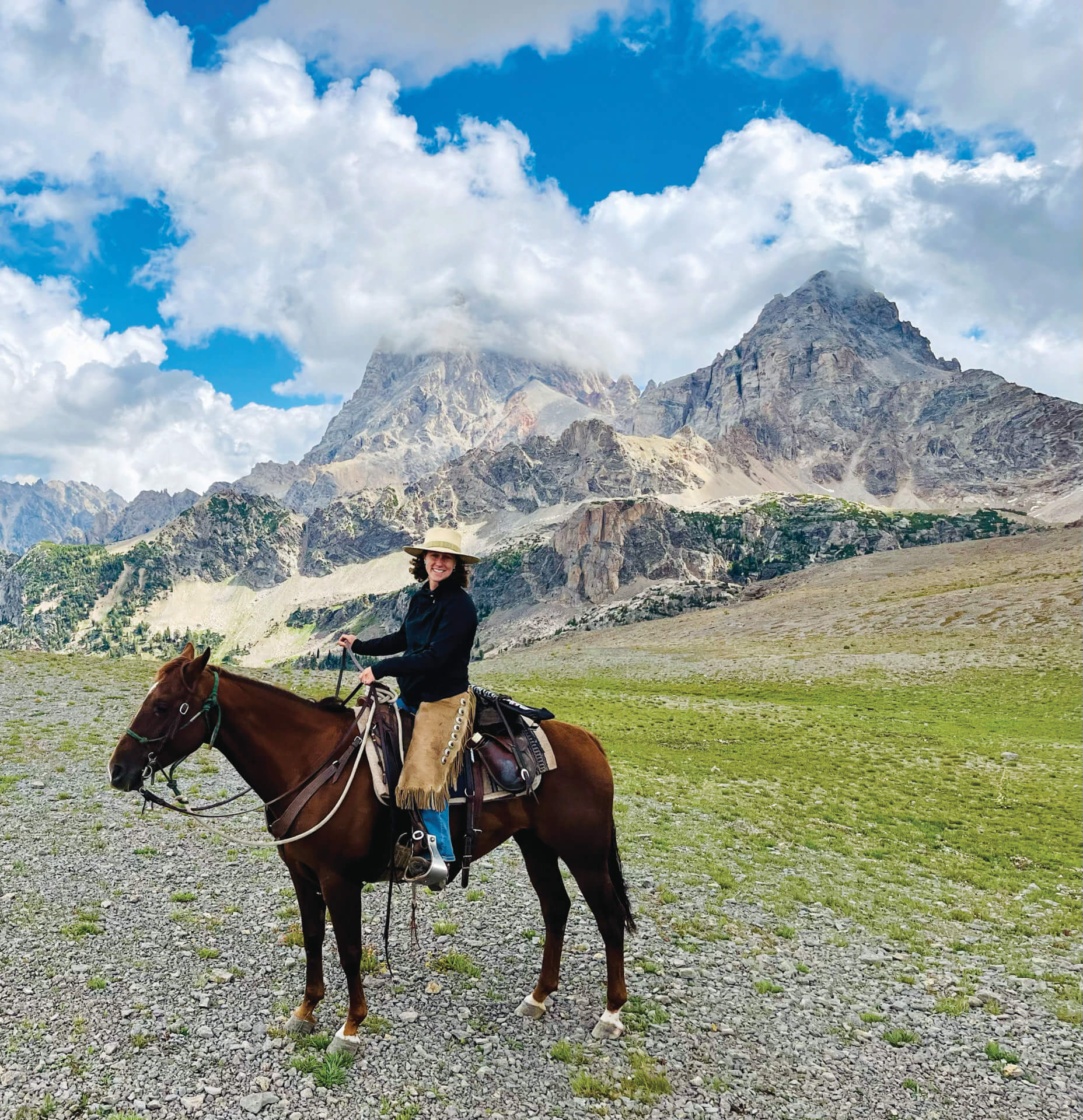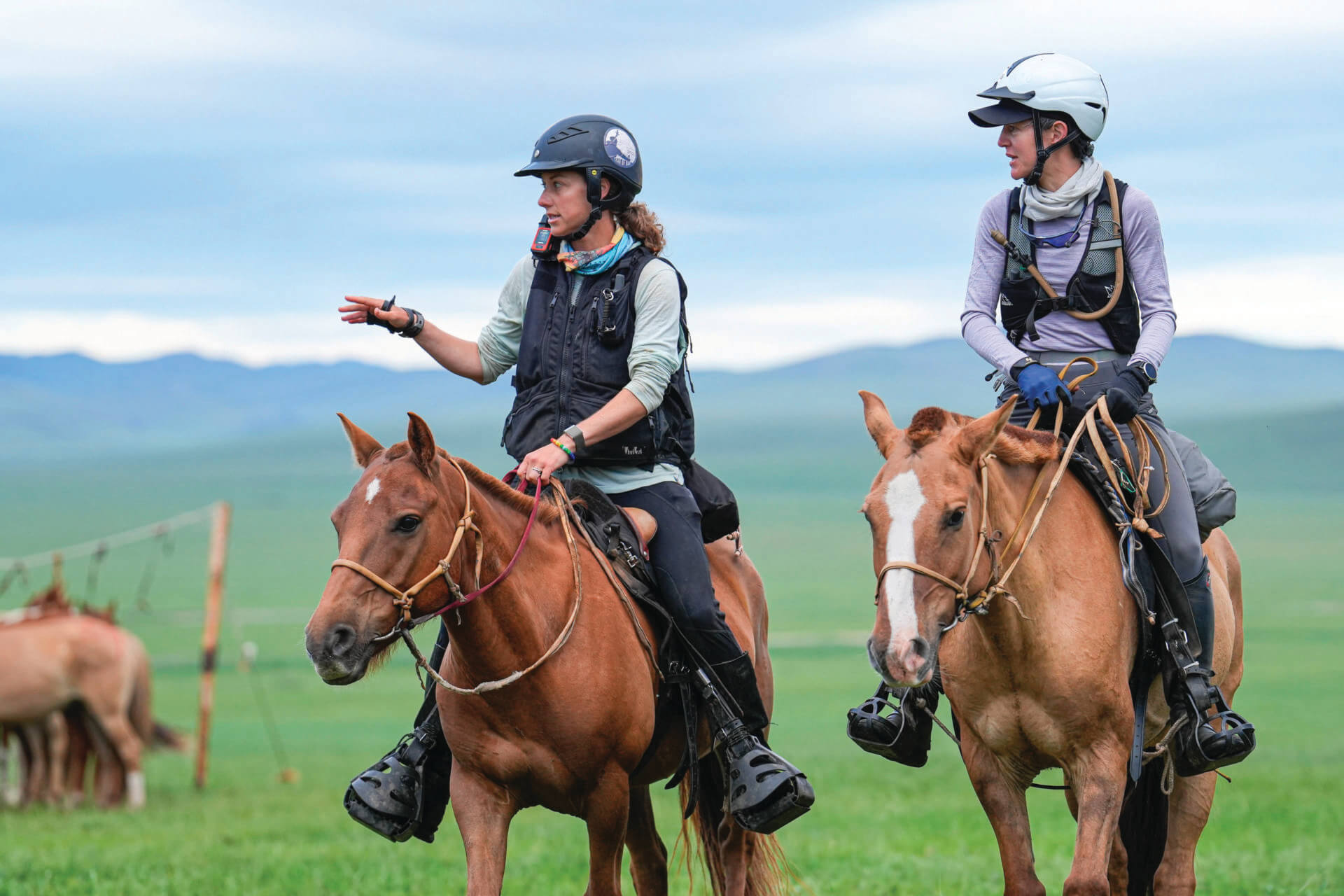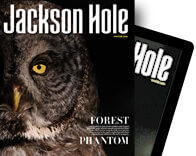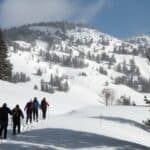Read The
Current Issue
Deirdre Griffith
//By Rachel Walker

In the two years since Jackson local Deirdre Griffith won the epic Mongol Derby—a 1,000-kilometer equestrian endurance race that recreates the horse messenger system developed by Genghis Khan in 1224—the longtime equestrienne has been busy. She helped to spearhead the Parental Mental Wellness program at St. John’s Health; earned recognition as one of the valley’s top-producing realtors; continued to raise two daughters, Lilah, 8, and Delaney, 6, with husband, Vance; and trained horses at the family’s rural property south of town. If there’s a common thread in these seemingly disparate accomplishments, it is Griffith’s passion for doing hard things and the discipline she has in all of her preparation.
Take the Mongol Derby. After the Covid-19 pandemic canceled the race in 2021, the year she originally intended to compete, Griffith tacked another 12 months of training onto her regimen. This meant an additional year to contemplate everything that could go wrong and to draw out her exhaustive physical training. “Two and a half years of preparation was grueling and emotionally difficult to manage,” Griffith says. “But I was dedicated. I kept at it and was really disciplined, which put me in a great position when the time came for the race itself.”
Griffith credits much of her discipline to having grown up riding horses. “I cannot remember a time when I did not ride,” she says. “Horses have always been the constant in my life.”
Growing up in Bolinas, California, Griffith trailed her older sister at the barn. She discovered horse packing and Western riding as a freshman at the Thacher School in Ojai, California. Upon arrival at the private boarding school, Griffith enrolled in its renowned horse program and was assigned a horse to care for, for the duration of the school year.
“Horses are one of the best things for a teenager.They teach humility and responsibility. They also level the playing field for kids coming from different backgrounds.”
“Horses are one of the best things for a teenager,” she says. “They teach humility and responsibility. They also level the playing field for kids coming from different backgrounds. Horses don’t care how much money your parents have or what kind of house you grew up in. The horse only cares about how it is treated.”
Once she discovered packing, a term used for loading horses and mules with equipment that can range from backcountry camps to construction materials to hunting equipment and more, and took her first overnight, she was hooked. And though she was only 14 at the time, the experience positioned her for a first career working as a packer for various outfitters in California, Colorado, and Wyoming. In those roles, she worked with horses and mules. “Packing is equal parts science and art,” she says. “Loads have to be perfectly balanced on each side, and the weight must be appropriate for the animal’s size and strength.”

More, packers have an arsenal of hitches—or knots—that they use, and they must also know how to keep a horse or mule healthy and nourished in the wilderness, far from modern conveniences. This entails everything from veterinary medicine to horseshoeing, as well as picking campsites that are protected.
Horse-packing trips allow riders to go deeper into the wilderness than they can on their own two feet, and it affords a certain amount of luxury; the pack animals facilitate bringing in nice food, a big stove, and comfortable bedding.
Packers must also be problem solvers. Camps must have adequate grazing and water for the animals, and have terrain that is conducive to keeping the animals there—which sometimes entails setting up a portable electric fence. Other times, it might mean tethering one horse and allowing the others to roam. Despite a packer’s best efforts and expertise, an animal may wander, and the packer needs to excel at tracking them down and returning them to camp.
The work ethic that made Griffith a successful packer and long-distance equestrian race champion helped fuel her massive fundraising effort to establish a program to screen new parents for postpartum depression at St. John’s. Those who show signs of the common ailment will be connected with a mental health professional within 24 hours. Having suffered from postpartum depression after the births of her daughters, Griffith struggled to find professional help when it might have been most effective—in the early days of new parenthood. Once she realized that her lack of enthusiasm might be a sign of depression—and not simply the exhaustion that comes from caring for an infant—she spent hours cold-calling therapists while caring for the baby and continuing to work. Had the Parental Mental Wellness program been in place when she was a new mother, “everything would have been much easier,” she says.
Now, having accomplished two goals—winning the world’s most difficult long-distance equestrian race and helping launch this valuable community resource—Griffith is beginning to contemplate her next big challenge.
“I don’t know what it will be, but whatever I do next will be out of my wheelhouse,” she says. “A triathlon or long-distance running. Something that pushes my boundaries. Horses are my comfort zone, and I think you really grow when you step outside of that.”

Deirdre’s Tips for New Parents
Listen to your body. “Postpartum depression is a hard thing to identify,” she says. “You don’t necessarily know you’re going through it because the hormonal changes are big and you’re already exhausted. But if something feels even a little off, listen to that and be willing to seek help.
Rest. “In Jackson, a lot of social life revolves around hard-charging athletic pursuits; you’re not meeting for coffee, you’re meeting to hike Snow King or ski. But when you have a baby, you have to take some time to recover, even if there’s a sense of missing out.”
Get outside. Griffith rode throughout her pregnancies and when her daughters were little. Whether your balm is horses, hiking, biking, or something else, make time to regularly be out in the fresh air.
Don’t compare. Social media reels can make you feel like the entire world is passing you by while you’re inside learning to become a parent. Ignore them if you can, and if they’re too distracting, delete the apps from your phone altogether.
Recognize the gift of sharing your world with your baby. “Having kids has made me slow down in my outdoor pursuits, but I actually enjoy them more because I am sharing them. ” JH




